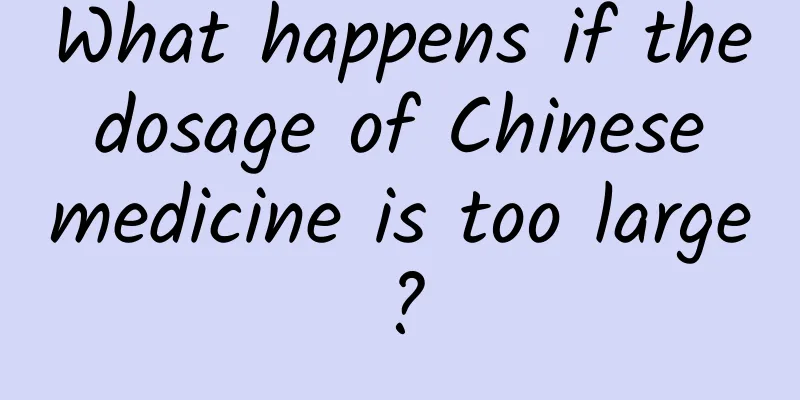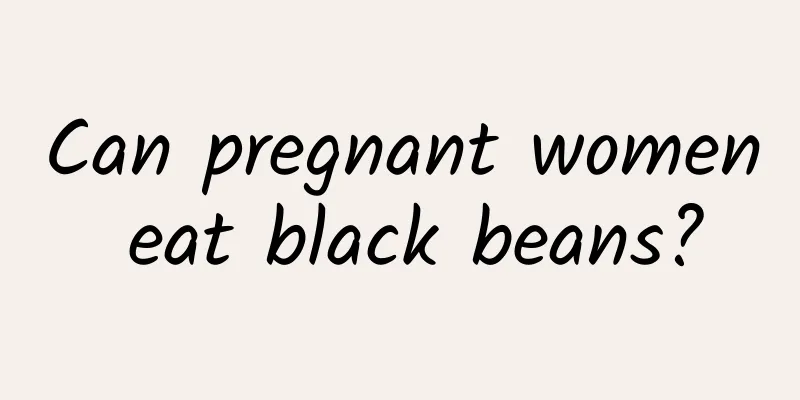What happens if the dosage of Chinese medicine is too large?

|
Many people believe that the side effects of traditional Chinese medicine are very small, so they always think that if they take less medicine, it will be useless, and they may even increase the dosage of traditional Chinese medicine privately. But what will happen if the dosage of traditional Chinese medicine is too large? Increasing the dosage of traditional Chinese medicine is also very dangerous. Although traditional Chinese medicine is considered to have few side effects, increasing the dosage will also be very harmful to the body. Otherwise, it will have the opposite effect. Therefore, you must take any medicine according to the doctor's instructions. How much is the appropriate dosage of Chinese medicine? Dosage is related to the efficacy of traditional Chinese medicine, but dosage is also a secret of traditional Chinese medicine. In recent years, when most clinical Chinese medicine practitioners are still prescribing "conditioning prescriptions" with dosages ranging from 10-15g, a group of Chinese medicine practitioners, some famous old Chinese medicine practitioners, some grassroots practitioners, and some university professors, have all chosen "large doses". Li Ke from Shanxi Province used 200g of aconite to treat heart failure, which became a legend. Professor Tong Xiaolin of Beijing University of Chinese Medicine used 60g of coptis root and 60g of gypsum to effectively reduce blood sugar. Zhang Binghou, a famous doctor in Beijing, used 100g of astragalus to treat ptosis. The First Affiliated Hospital of Tianjin University of Traditional Chinese Medicine used the same dosage as adults to treat pediatric diseases, which was effective time and again... These Chinese medicine practitioners who dare to break through the "Pharmacopoeia" and not follow the conventional route are not trying to be different, but the real efficacy gives them full confidence. As such cases become more and more common, people can't help but wonder: Compared with the original purpose of the classic prescriptions, which is "few but fine medicines, with specific effects and great power", are the current common small-dose, multi-flavor prescriptions in clinical practice too mediocre and too demanding? How should we understand and view the phenomenon of large-dose medications causing serious problems? Should we simply regard high doses as an academic school? Or should we trace back to the original meaning and change the textbook's "one liang of classical prescription is equivalent to 3g" to 10g or 15g, and generally increase the dosage of classical prescriptions? Or should we start from an experimental perspective and study its dose-effect relationship in order to seek scientific evidence? On November 5, at the "Seminar on Classic Prescription Drug Dosage and Modern Clinical Application" sponsored by the Chinese Medicine Journal and the Academic Management Office of the China Academy of Chinese Medical Sciences, more than a dozen experts in the fields of clinical Chinese medicine, Chinese medicine, and literature discussed this topic in full swing. Should the dosage of Chinese medicine in clinical practice be limited? Chinese medicine practitioners all know that "using medicine is like using soldiers", and the difference of a few taels or a few cents in the dosage of Chinese medicine is the most important. However, a survey found that a hospital's 1,000 prescriptions contained an average of 18 types of drugs, with dosages ranging from 5g to 15g. The most frequent dosage was 10g, and dosages such as 4g, 7g, and 13g never appeared. Yu Yingao from the China Academy of Chinese Medical Sciences said that judging from Chinese medicine literature, the dosage of prescriptions before the Ming Dynasty was basically the same as Zhang Zhongjing's original prescriptions, while the dosage after the Ming and Qing Dynasties was basically the same as it is now. There is no consensus on how much the dosage of traditional Chinese medicine should be converted to in later generations, ranging from 3g to 16g. However, the commonly used textbooks adopt the approach that "one liang in ancient times is equivalent to one qian today" and three liang is equivalent to 9g. For convenience, 10g is often used in clinical prescriptions. 2 What are the common misunderstandings about the use of traditional Chinese medicine? Myth 1: It cannot be used for first aid Some ancient prescriptions used to rescue critically ill patients, such as "Du Shen Tang", "Shen Fu Tang", "Si Ni Tang", etc. Now, on the basis of the original, some modern medical elements have been added to make Chinese medicine preparations with better and faster efficacy. Therefore, if used properly, Chinese medicine can also treat acute diseases. Myth 2: Can it be taken for a long time There are many Chinese medicines that are prone to adverse reactions such as cumulative poisoning. For example, Longdan Xiegan Pills can cause kidney damage if taken for a long time. Therefore, do not take it excessively. It should be taken in a certain dosage and under the guidance of a doctor, otherwise it will do more harm than good. Misconception 3: Arbitrarily increasing the dosage Although Chinese patent medicines are generally harmless to the body, some of them contain certain toxicity. If the dosage is not strictly required when taking them, the consequences will be disastrous. Even if the medicine does not contain toxic ingredients, it should not be taken casually. For example, Gengyi Pills, whose ingredients are aloe vera and cinnabar, can calm people and promote sleep when taken in moderation, but excessive use can easily have the opposite effect. Myth 4: Boil or take with boiling water In our daily life, many people have formed the habit of boiling medicines before taking them. In fact, this is very disadvantageous. Most Chinese patent medicines need to be taken with warm water. Boiling water is not only not conducive to the efficacy of the medicine, but also the active ingredients in the medicine are easily volatilized or decomposed and deteriorated at high temperatures. Myth 5: Adding sugar to bitter Chinese medicines Good medicine tastes bitter but is beneficial for curing diseases, and the bitter taste itself has a therapeutic effect. Adding sugar to Chinese patent medicine will not only affect its efficacy but also harm your health. For example, some stomachic drugs are used to promote the secretion of digestive juices. Adding sugar will reduce its stimulating effect. Certain chemical components in the drugs can react chemically with sugar and affect the efficacy of the drugs. There are also some rules to follow when taking medicines. Proper or improper use may be just a trivial action, but the consequences may vary greatly. |
<<: Is it effective to make Chinese medicine into granules?
>>: Why should Chinese medicine be taken hot?
Recommend
How does Traditional Chinese Medicine treat purpura?
Purpura is a relatively common skin disease that ...
Can I get pregnant if I have gynecological inflammation?
Many women have some gynecological problems to a ...
Heat-clearing Chinese herbs
Many people can easily get inflamed if they don&#...
Are mouth ulcers just caused by inflammation? Maybe it’s not that simple!
Many people have experienced oral ulcers and alwa...
Which Chinese medicines can lower blood sugar?
High blood sugar is mostly caused by lifestyle an...
What causes peeling on the face?
Many women will use various skin care products to...
Tension headaches have these symptoms
Tension headaches mostly occur in young and middl...
What to do if the skin on the genitals is broken
The male genitals can be said to be the most vuln...
Is rhinoplasty good?
In fact, Chinese people are very concerned about ...
What should I do if I have sex after half a month of confinement?
You should also take a confinement period after a...
What will happen if a nine-month-old baby falls from the bed?
At nine months old, children can already start to...
What medicine is used for candidal infection
Streptococcus is also a type of bacteria. If the ...
Low number of intermediate cells
In daily life, it is difficult for people to avoi...
Thrombocytopenia Subcutaneous hemorrhage
Subcutaneous bleeding due to thrombocytopenia is ...
The efficacy of bamboo shoots
Gaosun, also known as茭白, is a relatively common C...









